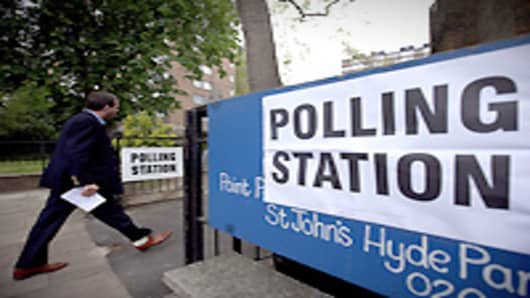If victory on Thursday could be a poisoned chalice, there has been little in the last-minute campaigning by the three main contenders for 10 Downing Street — Prime Minister Gordon Brown for Labour, the Conservative opposition leader David Cameron and the Liberal Democrats’ leader, Nick Clegg — to suggest it. On the contrary, veteran political reporters said they could not recall a campaign since at least 1992 that involved such a frantic dash to the finish line, above all by the man who is heavily favored to win the largest bloc in the 650-seat House of Commons, Mr. Cameron.
He campaigned through the night on Tuesday, racing from one encounter with night-shift workers to another.
Mr. Cameron, at least, is no stranger to financial crises. At 43, and like many of those likely to serve in a Conservative cabinet, he has limited experience in government. But he was an aide in the Treasury on what became known as “Black Wednesday” in 1992, when the pound sterling was withdrawn from the European Exchange Rate Mechanism at cost of more than $6 billion to British taxpayers.
While Mr. Cameron seems most likely to emerge from Thursday’s vote as prime minister, it is far from a done deal. Polls in recent days have shown the Conservatives pulling out a narrow lead of about 5 percentage points. The polls have shown Labour and the Liberal Democrats vying for second place, with their ratings one side or another of about 30 percent of the vote.
All three party leaders have centered their campaigns on vague pledges to cut government spending, which has caused deficits on a scale not seen since World War II, when Britain fought Germany and Japan largely on borrowed money.
The comparisons with Greece begin with the current year’s deficit, which at 11.5 percent of gross domestic product is not far off the 13.6 percent figure for Greece and considerably larger than the figures for Spain and Portugal, which some economists fear may be the next European countries bidding for international bailouts.
The immediate political liability for this lies with Mr. Brown and the Labour Party, which engaged in a spree of epic proportions after taking power in 1997, spending at a rate that has outstripped inflation by 41 percent. The current budget of about $1.1 trillion includes more than $150 billion on the state-run National Health Service, triple the amount when Labour came to power.
One in every four pounds the government spends is borrowed, a pattern that economists say will require the next government to make cuts on a scale not experienced since the Great Depression, as well as painful tax increases.
When these issues have been discussed at all in the campaign, it has usually been in the context of which of the parties could get away with being most evasive in setting out deficit-reduction plans that economists say fall far short of the cuts that will be needed.
One man who knows more than most about the scale of the problem is Mervyn King, governor of the Bank of England, Britain’s central bank. David Hale, a Chicago-based economist, said last week that Mr. King had told him that “whoever wins will be out of power for a whole generation because of how tough the fiscal austerity will have to be.” Mr. Hale, speaking on Australian television, met in off-the-record sessions with Lord King in London in March, according to a bank spokesmen, who did not deny the accuracy of the American’s account.
Still, few people here think that the austerity measures needed to right the country’s finances could lead to Greece-style chaos. One important measure, according to financial experts, is that interest rates on British treasury bonds have remained low at around 4 percent even as interest rates on Greek debt have at times soared well into double digits, reflecting market confidence that Britain’s leaders will find responsible ways of reducing the debt.
Yet, the measures that will be needed are likely to require deep cuts in the public services on which the vast majority of Britain’s 62 million people depend, as well as in the state-employed work force of more than six million.
On the campaign trail, Mr. Brown has focused his fire on the Conservatives, saying their plans for sharp cuts immediately after the election would endanger the economic recovery in Britain.
But others say that delaying or restraining the cuts poses a greater risk. Kenneth Clarke, a former chancellor of the Exchequer and one of the few veterans of previous Conservative governments on Mr. Cameron’s team, has said that any postponement in attacking the deficit could lead to a run on the pound and to Britain having to go cap-in-hand to the I.M.F., as a Labour government did in 1976.
But even Mr. Cameron has had to trim his sails. Among other things, he has fenced himself in by promising to continue to increase the politically sensitive National Health Service budget, and to protect Britain’s “most vulnerable” people from cuts in social spending.
The Conservatives could emerge from the election short of a majority and dependent on the Liberal Democrats’ support to govern. That could lead to an impasse, because Mr. Clegg favors huge defense cuts that the Conservatives are likely to reject, and he agrees with Labour on delaying the deepest cuts until the economic recovery is secure.
British commentators have said that one option for the Conservatives would be to take office with a minority government and go to Parliament within a matter of weeks, saying that their new access to details of the public finances had convinced them that much deeper cuts were required than even they realized. The prospect then would be for a second election in the autumn, in which voters would be asked for a mandate supporting the Conservative cuts.


